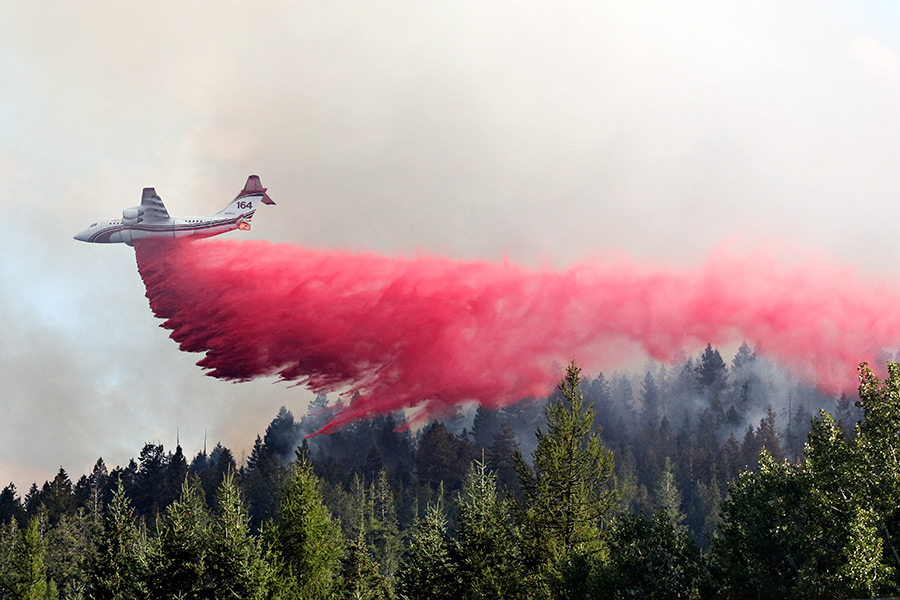A century ago, President Theodore Roosevelt established the U.S. Forest Service to manage 193 million acres of national forests and grasslands, a mission that today is being consumed by the ever-increasing costs of fighting fires.
As wildfire season becomes longer and blazes grow more intense due in part to climate change and sluggish timber management, the rising expenditures of firefighting are eating up the U.S. Forest Service’s (USFS) budget at an unsustainable pace, while the risks to health and human safety have grown exponentially.
Recent legislative efforts to craft a solution have been stymied by partisan politicking, but a new bipartisan forest management reform measure introduced by U.S. Sen. Steve Daines, R-Montana, and U.S. Sen. Dianne Feinstein, D-California, aims to buck that trend.
“Both California and Montana have been facing some major wildfire seasons over the last few years,” Daines said in a press conference announcing the legislation. “This bill will speed up urgently needed projects to reduce wildfire risks, create good-paying jobs in the forestry sector, and protect public health and safety.”
On Aug. 5, Daines and Feinstein introduced the Emergency Wildfire and Public Safety Act during a joint press conference, billing the measure as a major forest management reform bill that is the product of more than a year of negotiations.
The senators first announced their intention to introduce the bill last year on the heels of a record wildfire season in Montana and following destructive fires near Paradise, California, which killed dozens of residents and destroyed 15,000 homes. Daines said the unlikely duo spent the last year going back and forth on provisions of the bill, speaking to interested parties and securing sponsors of companion legislation in the House.
The legislation proposes new programs and multiple areas of reform, including:
-Directs the USFS to complete three landscape-level, collaborative projects in the West to reduce the risk of wildfire. Projects are proposed by governors and enjoy National Environmental Protection Act streamlining and litigation protections.
-Creates a categorical exclusion exempting some projects from full environmental review, with an emphasis on fuel reduction projects near roads, trails and transmission lines — infrastructure near which most fires occur, Daines said.
-Attempts to curb environmental litigation by requiring “new information” surrounding species listed under the Endangered Species Act to meet thresholds, allowing projects to move forward while agencies like the USFS consult with the U.S. Fish and Wildlife Service.
-Accelerates post-fire restoration and reforestation by creating a new statutory authority modeled after the USFS’ existing Emergency Situation Determination authority. The decision to grant such authority would not be subject to environmental review, and the corresponding projects could be carried out using a streamlined process.
-Establishes a new grant program in the U.S. Department of Energy to facilitate removal of biomass from National Forest areas that are at high risk of wildfire and to transport that biomass to conversion facilities.
-Encourages the U.S. Department of Agriculture and Department of Interior to increase use of wildfire detection equipment.
In unveiling the bill, Daines emphasized its support from the Montana Wood Products Association, Rocky Mountain Elk Foundation, Northwestern Energy and the Montana Logging Association.
However, it has received pushback from conservation organizations that say it aims to fast-track large-scale logging projects through legislative exemptions that bypass environmental review and limit public engagement.
“This legislation would undermine bedrock environmental laws and the rule of law in order to promote increased logging of national forests far from the homes and communities that are in most need of attention to reduce wildfire risk,” according to a statement from The Wilderness Society, which opposes portions of the measure. “These provisions stand in stark contrast to the sensible, science-based approaches included in this bill that would help communities in fire-prone areas.”
In 2017, Daines cosponsored a bill with Sen. Jon Tester (the Wildfire Protection and Mitigation Act), containing many of the same provisions currently included in the bill he cosponsored with Feinstein. The Wildfire Protection and Mitigation Act has languished in a Senate committee for more than two years, and Daines said he hopes to avoid a stalemate with the new proposal.
“I look forward to working closely with Sen. Feinstein to pass this legislation and send it to the President’s desk,” Daines said, adding that he hopes it will receive a committee hearing next month.
